- Home
- Robert Graves
Homer's Daughter Page 2
Homer's Daughter Read online
Page 2
To come down to more recent times: my great-grandfather, King Nausithous, son of Eurymedon’s daughter, called a council of all the Elymans to deliberate on a vision which had been granted him in a dream. He saw an eagle swoop from the top of Eryx and skim the sea, in company with a flock of white-winged sea mews, some of them on his right hand, some on his left. This vision the soothsayers interpreted as a divine command to quit Hypereia and henceforth make his living from the sea, on a spit of land between two harbours. Leaving behind a strong force to guard his cattlemen, shepherds and swineherds against the depredations of Sican bandits, Nausithous led down the greater part of the Hypereians to a sickle-shaped peninsula two miles south of Rheithrum, where he built the town of Drepanum. According to a local tradition it was here that the ancient God Cronus threw into the sea the adamantine sickle with which he had castrated his father Uranus; and old men sometimes whisper darkly: “One day it will be fetched up in a net; Apollo is fated to use it against his father Zeus.”
Drepanum was a splendid site for Nausithous’s new town. The neck of the peninsula could be protected by a wall from Sican raids, and of the two harbours specified by the oracle, one sheltered ships against north-westerly gales, the other against south-easterly ones. Since, therefore, the Phocaeans of Aegesta, whom Nausithous invited to join him in this enterprise, had not forgotten their sea skill, he was soon sending fifty-oared ships on long voyages in every direction. The chief Elyman exports, then as now, were wine, cheeses, honey, fleeces, sun-dried tunny and swordfish, and other food products; as well as folding bedsteads of cypress wood, in the manufacture of which we excel, embroidered clothes of the finest wool, and salt from our salt pans. These goods were exchanged for Cyprian copper, Spanish tin, Chalybean iron, Cretan wine, Corinthian painted ware, African sponges and ivory, and many other luxuries. Our two sandy harbours proved of great advantage, since if ever the weather shows signs of changing, ships can be rowed from one to the other, and hauled up beyond reach of the waves. In short, we have grown rich and prosperous, and are welcomed by all nations with whom we trade as honest men and no pirates. Rheithrum, however, is now rarely used as a harbour, not being defensible against raids, and has of late been silting up; but we sacrifice there annually to Aphrodite and Poseidon, and graze our cattle on the neighbouring plain.
My father, King Alpheides, married the daughter of an ally, the Lord of Hiera, largest of the Aegadean Islands. She bore him four sons and one daughter, myself. At the point where this story begins, Laodamas, my eldest brother, was already married to Ctimene of Bucinna, another island of the Aegadean group; Halius, the second, driven from home by my father’s displeasure, had gone to live among the Sicels of Minoa; Clytoneus, the third, had shaved his first manly hair and taken arms. I was three years older than Clytoneus, and unmarried—but by choice, not from lack of suitors, though I may as well confess that I am neither tall nor particularly beautiful. My fourth brother, Telegonus, the child of our mother’s middle age, still lived in the women’s quarters, rolling nuts or riding a dappled hobbyhorse, and being threatened with King Echetus, the bogeyman, if he did not behave. In the poem which I have now completed my parents appear as King Alcinous and Queen Arete of Drepane—the royal couple who welcomed Jason and Medea in the Song of the Golden Fleece. I chose these names partly because “Alcinous” means “Strong-minded”, and my father prides himself most on his strong-mindedness; partly because Arete (if you shorten the second e) means “Staunchness”, which is my mother’s ruling virtue; and partly because, at the crisis of my drama, I was forced to play Medea’s part. So much, then, for that.
CHAPTER
ONE
THE AMBER
NECKLACE
One luckless evening, three years ago, when my brother Laodamas had been married for only a short time, the southern wind we call sirocco began to blow, and a great cloud brooded heavily on the shoulders of Mount Eryx. The effect was, as usual, to wither the plants in the garden, put my hair out of curl and make everyone touchy and quarrelsome: my sister-in-law Ctimene not the least That night, as soon as she found herself alone with Laodamas in their stifling bedroom, which was on the upper storey overlooking the banqueting court, she began to reproach him for his idleness and lack of enterprise. Ctimene enlarged on the great value of her dowry, and asked him whether he were not ashamed to spend his days hunting or fishing, instead of winning wealth by bold adventures overseas.
Laodamas laughed, and answered lightly that she had only herself to blame: it was her fresh beauty that kept him at home. “Once I tire of your delectable body, Wife, I shall certainly sail away—as far as any ship can take me, to the Land of Colchis and the Stables of the Sun, if need be—but that time is not come.”
Ctimene said crossly: “Yes, you do not seem destined to tire of my embraces for a long while yet, the way you pester me with your nightly attentions. But at the first streak of dawn, off you go, eager only for your hounds, your boar spear, and your bow. I never see you again until nightfall, when you eat like a wolf, drink like a porpoise, play a foxy game or two of chess, and lurch along to bed once more to smother me with your hot, bearish caresses.”
“You would not think much of me if I failed in my husbandly duty.”
“A husband’s duty is not performed only between linen sheets.”
It was as when a long-armed boxer manages to keep his small, hard-hitting opponent at a distance with left-handed jabs, until at last he slips under the tall fellow’s guard and pummels him below the heart. Laodamas grew rattled, but showed that he, too, was no novice at in-fighting. “Do you expect me to lounge around the house all day,” he asked, “telling you stories while you spin, skeining the wool, and running errands for you? I intend to remain at Drepanum until you have obliged me by becoming pregnant—if, indeed, you are not barren, like your aunt and your elder sister—but while I am still here it is certainly a manlier pastime to hunt wild goats or wild boars than to kill the hours between breakfast and supper as most young men of my age and rank do: namely to drink, dice, dance, gossip in the market place, fish with line, hook and float from the quay, and play quoits in the courtyard. Or perhaps you would prefer me to spin and weave myself, as Hercules did in Lydia, when Queen Omphale bewitched him?”
“I want a necklace,” said Ctimene suddenly. “I want a beautiful necklace of Hyperborean amber, with nubbly gold beads between the lumps, and a golden clasp shaped like two serpents with interlocking tails.”
“Oh, you do? And where is such a treasure to be had?”
“Eurymachus’s mother already owns one, and Captain Dymas has promised another to his daughter Procne, Nausicaa’s friend, when he returns from his next voyage to Sandy Pylus.”
“Do you perhaps wish me to ambush his ship as she sails home past Motya and steal the necklace for you—in the Bucinnan style?”
“I refuse to understand your joke against my island—if it is supposed to be a joke. No, do not dare kiss me! The wind is cruel and I have a headache. Go away, and sleep elsewhere. Dawn, I hope, will find you in a more reasonable frame of mind.”
“I may not kiss my wife good night, is this what you mean? Take care that I do not send you back to your father, dowry and all!”
“Dowry and all? That will not be easy. Of the two hundred copper ingots and twenty bales of linen salvaged from the Sidonian ship which my father found drifting, crewless, off Bucinna…”
“Drifting, do you say? He murdered the entire crew in traditional Bucinnan style; as is well known in every market place of Sicily.”
“…of copper ingots and bales of linen, I repeat, you invested nearly half in a Libyan trading venture. They were to be bartered for herb Benjamin, gold dust and ostrich eggs; but I doubt whether you will see them again.”
“Women can never believe that once a ship has raised anchor and spread her sails she will ever make port.”
“I am not questioning the seaworthiness of the ship, but only the integrity of her captain, whom you were a fool to
trust on the advice of your friend Eurymachus. It would not be the first time that a Libyan defaulted, and if anyone tells me that Eurymachus demanded a commission for his part in the fraud, I shall believe him.”
“Look, this argument can be doing your headache very little good,” said Laodamas. “Let me fetch you a bowl of water and a soft cloth to bathe your temples. The sirocco is killing us all.”
What he intended for kindness she took as irony. After lying silent and inert until he brought the silver bowl to her bedside, she sat up suddenly, seized it from him, and deluged him with water.
“To cool down your hot thighs, Priapus!” she screamed.
Laodamas did not lose his temper and take her by the throat, as many a more impetuous man would have done. I never knew him to lay violent hands on a woman, not even to chastise a saucy slave girl. He merely cast Ctimene a baleful look and said: “Very well, then: you shall have your necklace, never fear, and may it bring less sorrow on our house than did the necklace of Theban Eriphyle in the Homeric song!”
He walked over to a nail-studded wooden chest, unlocked it, and took out a number of personal possessions—a gold cup, a helmet with an ostrich-feather plume, a buckle of silver and lapis lazuli, a new pair of scarlet shoes, three undershirts, a jewel-hilted dagger in an ivory sheath carved with lions pursuing a royal stag, and a fine whetstone from Seriphos. He pulled the helmet on his head, spread a thick cloak of striped wool on the floor and laid the treasures in it. Then he locked the chest, replaced the key on the nail above the bed head, caught up the bundle, and fumbled at the latch.
“Where are you taking those things? I demand to know. Put them back at once! I have something to tell you.”
Laodamas paid no attention, but walked out, bundle on shoulder.
“To the crows with you, then, madman!” screamed Ctimene.
This conversation took place about midnight. My bedroom was next door, and my hearing being unusually acute when I have a touch of fever, as I had then, every word reached me. Slipping hurriedly into my shift, I ran after Laodamas and caught him by the sleeve. “Where are you going, Brother?” I asked.
He looked at me dully. He had been drinking sweet dark wine that evening, and though his gait was steady, I could see that he was by no means himself.
“I am going to the crows, little Sister,” he answered sadly. “Ctimene has consigned me to their care.”
“Please, pay no attention to what your wife may have said tonight,” I begged him. “A sirocco is blowing; and at this time of the month she is never at her best.”
“She demands a necklace of amber with nubbly gold beads, and a clasp of interlocking golden snakes. It has to be pale Hyperborean amber; our own darker variety does not content her, though it has a lovely play of purple which occurs in no other. I mean to fetch her what she wants: in proof that I am neither idle nor a coward.”
“From where? From the crows?”
“Or the jackdaws… I cannot let her abuse me again as she has done. All the maids must have been listening, and soon the story will travel around the city. When it reaches Eurymachus and his friends, they will call me a fool for not taking a strap to her.”
“No strap ever cured either a shrew or a sick woman.”
“I agree; though if I loved Ctimene in a different way I might think otherwise. It is to keep my hands from violence that I am leaving her.”
“For how long?”
“Until I can bring her the necklace. Two or three months’ separation may do us both a deal of good.”
“I heard you mention the necklace of Eryphyle, which was a word of ill omen. Unless you offer a sacrifice to the Goddess of our Hearth, and another to Aphrodite, the safety of our whole household will be endangered. Do not go off with your wrong foot thrust forward. Stop, and replace those things in the chest.”
“And ask Ctimene’s pardon, I suppose? No, I cannot turn back now. Some god is urging me on. Good night, Sister! We shall meet when we shall meet.”
The story of Eriphyle is part of the famous Theban cycle which the Sons of Homer recite. This hateful woman was married to King Amphiaraus the Argive but, for the sake of Aphrodite’s necklace, which made its wearer irresistibly beautiful, she sent him to his death at Thebes.
Laodamas clumped slowly downstairs, and I heard him growling at the porter to unbar the front gate. Presently I leaned out of my window and saw him in the moonlight on his way towards the quay, where a big Rhodian ship was tied up. I thought of rousing my father, but knowing that he had fallen into a deep, refreshing sleep, after three days of fever, dared not disturb him with what might prove a matter of little importance. Ctimene herself treated it as such. Laodamas, she told herself, would not retract his insulting remarks about her father, nor listen when she tried to apologize for having lost her temper. So she turned her face to the wall with a good conscience, and was soon fast asleep.
I lay awake in the moonlight until I heard a distant burst of singing, as if a crowd of men had come pouring out of some storehouse or other; and, in the chorus of drunken laughter which followed, I recognized Eurymachus’s high-pitched cackle.
“All is well,” I thought wearily. “Eurymachus is still about. How I dislike him; but he will at least prevent my brother from behaving rashly or stupidly.”
CHAPTER
TWO
THE PALACE
When, next morning, we found the Rhodian ship had disappeared, taking advantage of a sudden change of wind, and that Laodamas was also missing, I hurriedly visited the Temple of Poseidon, where Eurymachus would soon be offering the monthly sacrifice of a red bull, to ask him what he knew of the matter.
“Nothing at all, my dear Princess. Why should I?” he answered stolidly, leaning on the sacrificial axe, and looking straight into my eyes, as if to disconcert me.
“Why? Because you were on the quay with Laodamas last night; please do not attempt to deny it. I heard your cackle of laughter when the Rhodians sang that obscene song about their ancestor Hermes and the slippery goatskin.”
“That must have been just before I said good night.”
“Why did you not look after him with decent care? He was drunk and unhappy. Your duty as his comrade demanded it.”
“He showed me little tenderness and, as the saying is, two are needed to make a comradeship, but only one to dissolve it. The failure of that Libyan adventure seems to have turned his wits. Last night he wildly accused me of conspiring with the captain to steal Ctimene’s copper and linen and then pretend that the ship had been wrecked off the Syrtes. When I reminded him of our old friendship, and hinted that he must be bewitched to talk such extravagant nonsense, he grew unbearably abusive. So, rather than encourage him to use his fists and have his nose flattened—I am by far the better boxer even when he is sober—I turned on my heel and retired to bed, pleased with my own moderation. It came as a surprise this morning to find the Rhodian purple-sellers gone. Do you think that Laodamas joined them?”
Eurymachus could never be frank with me. I thought at the time: “Because he is one of my suitors, and the one whom my father would most like me to marry (always supposing that he offers an adequate bride price), he does not care to reveal his faults to me prematurely.” Yet I have always hated a man who, trying to hide crooked intentions behind a honeyed smile, is vain enough to believe that I cannot see through him.
“If he has sailed,” I answered severely, “my father will not think the better of you.”
“No, perhaps not—until I have explained what happened, in the same words that I have used to you. Then doubtless I shall find him more ready to believe me.” As he spoke, one of our house-born slaves brought a message from my father himself, announcing that the fever had passed, and that he would be greatly obliged if Eurymachus could confer with him, as soon as the sacrifice was over, about the two night watchmen.
“Which watchmen?” I asked the slave.
“The dawn watch on the quay,” he answered. “Their relief has just reported
them lying in a drugged sleep behind the sail shed. Two sails and three coils of the best Byblian cordage are missing.”
“There now, Eurymachus,” I said. “What do you make of that?”
I studied his face, but he had made it a blank. “Surely a most unusual piece of news?” I pressed him. “Rhodians have a reputation for strict commercial honesty, and I cannot see why one of their big ships should jeopardize it merely for the sake of two sails and a coil or two of cordage.”
He answered glibly: “There is something in what you say, lovely Nausicaa. Perhaps they needed the gear at once and could not wait for an audience with the port authority; so helped themselves, drugged the guards to prevent them from raising the alarm, and went off.”
“In that case they would have left adequate payment behind in the form of metal or wine.”
“Not if Laodamas went with them and undertook, in payment for his fare, to settle the debt on his return. Here comes the red bullock with the fillet on his head. Excuse my haste. Slave, tell the King that I rejoice to hear of the improvement in his health, and that I will discuss the affair of the watchmen as soon as this sacrifice is over and I have inspected the entrails.”

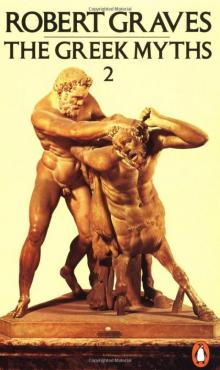 The Greek Myths, Volume2
The Greek Myths, Volume2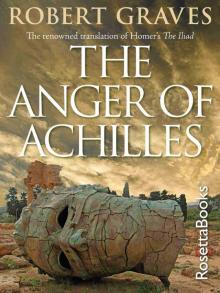 The Anger of Achilles: Homer's Iliad
The Anger of Achilles: Homer's Iliad Count Belisarius
Count Belisarius The Twelve Caesars
The Twelve Caesars Complete Poems 3 (Robert Graves Programme)
Complete Poems 3 (Robert Graves Programme) Homer's Daughter
Homer's Daughter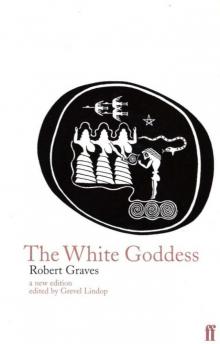 The White Goddess
The White Goddess Goodbye to All That
Goodbye to All That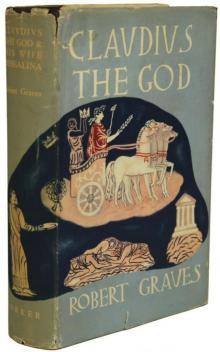 Claudius the God and His Wife Messalina
Claudius the God and His Wife Messalina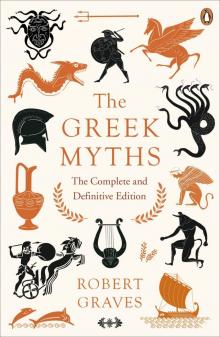 The Greek Myths
The Greek Myths I, Claudius
I, Claudius The Islands of Unwisdom
The Islands of Unwisdom Complete Short Stories
Complete Short Stories The Golden Fleece
The Golden Fleece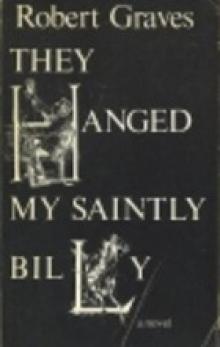 They Hanged My Saintly Billy
They Hanged My Saintly Billy King Jesus
King Jesus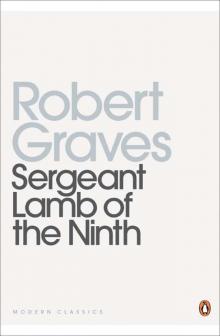 Sergeant Lamb's America
Sergeant Lamb's America Hebrew Myths: The Book of Genesis
Hebrew Myths: The Book of Genesis Seven Days in New Crete
Seven Days in New Crete Proceed, Sergeant Lamb
Proceed, Sergeant Lamb Claudius the God
Claudius the God Wife to Mr. Milton
Wife to Mr. Milton The Complete Poems
The Complete Poems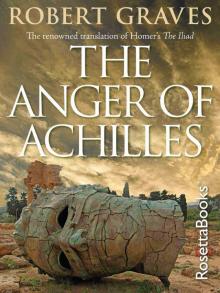 The Anger of Achilles
The Anger of Achilles Claudius the God c-2
Claudius the God c-2 Hebrew Myths
Hebrew Myths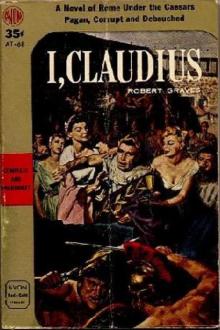 I, Claudius c-1
I, Claudius c-1 The Greek Myths, Volume 1
The Greek Myths, Volume 1